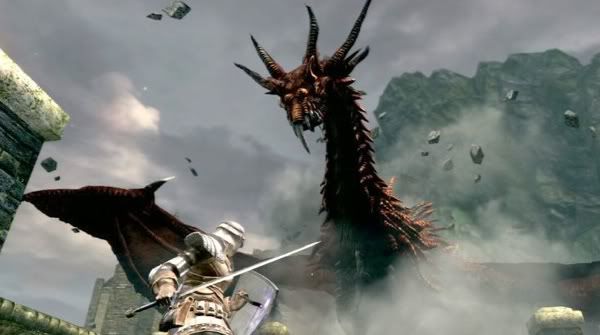This post has not been edited by the GamesBeat staff. Opinions by GamesBeat community writers do not necessarily reflect those of the staff.
This article may contain spoliers for Dark Souls.

My Knight awakes next to a burning bonfire. I’m not sure where I am…a massive crow, larger than a man, dropped me here moments ago. Not unlike Demon’s Souls, another crestfallen warrior sits near the blaze. I approach this broken-hearted soldier, but he gives me little direction save for a few cryptic hints.
I look around a bit. I can go through an archway toward what appears to be a flooded shrine of some sort. I can head left up a long flight of stone steps affixed to a rock wall. Or I can turn around and march down a spiraling staircase that leads deep underground.
This is how Dark Souls begins. The game has no bright-lit marker on a bottom-left-corner mini-radar. No arrow that hugs the edge of the screen. No button to tap that draws a direct path for me to follow. No explicit dialogue telling me where to go.
And for that, I’m thankful. Dark Souls isn’t afraid to treat me like the adult I am.
I choose to go through the archway and shrine. Two skeletons reform from bone fragments on the ground, and their attacks catch me off guard. The fight is long and arduous. My strikes barely scratch their health bars, but I emerge victorious through careful management of actions that deplete a regenerating stamina bar (if this reaches zero at any point, characters become vulnerable to counter attack). Their deaths award me nothing, though — not even souls, which is the game’s currency and experience.
This is how Dark Souls communicates to the player. Rather than overtly commanding adventurers to traverse area A through path B to destination C, From Software’s brilliant use of environmental clues and subtle suggestions reward those with a careful eye.

Realizing that I may not be ready to proceed farther in this skeleton-infested graveyard, I turn back and walk up the staircase protruding from the mountainside. The hollow warriors and soldiers guarding this pass are much easier opponents, and I now know that the Undead Burg is a more appropriate direction for the time being.
Here, one of the first enemies lobs an easily avoidable firebomb, which cues me to two things: I should be wary of overhead adversaries, and I should plan to increase my fire defense soon. At no point does a tool-tip pop-up forcibly pause the action and explain exactly what I need to do (even the tutorial’s control explanations are entirely optional). Dark Souls understands — no, expects — that I’m smart enough to figure these things out on my own.
And even when an exploitable weakness isn’t so patently obvious, I have From Software’s innovative online functionality to offer assistance. Upon approaching the Taurus Demon’s lair, two skeletons will snipe at your back from a tower above the bridge where you stand. This should encourage you to turn around, scale the ladder, and eliminate the threat before engaging the boss. Up there, a fellow traveler might have left a helpful hint that advises you to try a "plunging attack," which is a technique you should have learned from fighting the Asylum Demon.
You can also activate the bloodstains of fallen players and watch their last 10 seconds as they futilely fight for their characters’ lives. You might see a ghostly figure walk across a bridge guarded by a looming dragon, stop suddenly, turn to run back, and immediately collapse to the ground. Perhaps a warning of certain death by fire?

All the talk of Dark Souls’ unyielding brutality hides the truth behind the allure of this dark-fantasy title: Some of us have grown bored with the state of modern game design.
Long ago, I played a lot of new releases. But in recent years, I’ve only devoted time to those willing to demonstrate a sense of mutual respect. I’m much older now, and I don’t want to waste the few, solitary hours I have at night with empty and ultimately unfulfilling experiences.
Dark Souls understands that I’m interested in more than just going through the motions of a carefully planned sequence of scripted events that all but eliminates the possibility of failure. Dark Souls understands that an invisible guiding hand that saves a reloadable checkpoint every left step is an insult to my intelligence. Dark Souls understands that I might want to imprint my own ideas on the playthrough…that I might want to engage this interactive medium in more cerebral, dynamic, and organic ways than a linear, canned, and one-dimensional romp through the tried-and-true has the capacity to offer.
I realize that Dark Souls may not be for everyone, but that's OK. I feel satisfied enough in the knowledge that it's for me.
